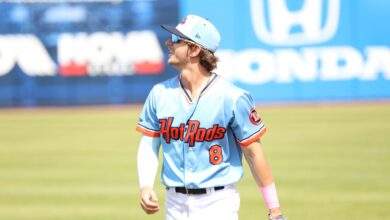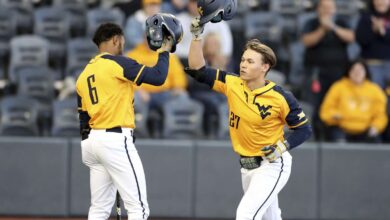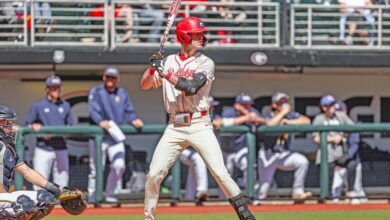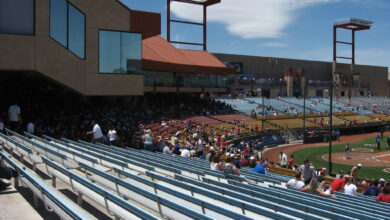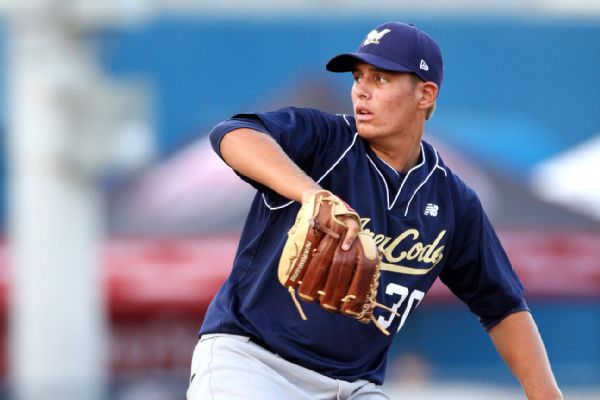
The 2014 MLB draft is in the books, and it wasn’t as wacky as everyone thought it would be. Aside from a few reaches in the first round and Johnny Manziel being drafted by the San Diego Padres in round 28, it mostly went as expected. Here is my recap of the first round, minus the comp picks:
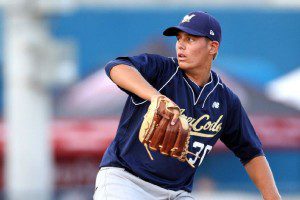
1. Houston Astros –Brady Aiken, LHP, Cathedral Catholic HS (CA)
The Astros — always tight-lipped regarding the draft — opted for the best player available in Aiken, a 6’-4”, 200 pound southpaw who has drawn the Clayton Kershaw comparison for his size, stuff and polish from the left side. Aiken shot up draft boards all year as he showed a spike in velocity, sitting 91-94 mph with his fastball. He adds two potential plus secondary offerings in a curveball and change-up and he commands all three very well. His easy delivery still leaves room for projection. He finished with 111 K/15 BB over 59.2 innings.
2. Miami Marlins — Tyler Kolek, RHP, Shepherd HS (TX)
There was some chatter that Kolek was dropping a bit leading up to the draft and could go as low as 10. With the recent epidemic of pitchers undergoing Tommy John surgery, the thought was teams would shy away from a high school kid who can routinely touch 100 mph with his fastball. Of course, that chatter may have been coming from the Marlins camp to make sure the Astros didn’t take him first. If it was in fact the Marlins sending a little birdie out, it may have worked. They snagged the 6’-5”, 240 pound right-hander with the golden arm. Aside from the gasoline he throws with ease, he adds a potential plus slider and has a good feel for a change-up that he never needed at the high school level. Over 54.1 innings, he had 112 K/6 BB, allowing two runs on 20 hits. He threw a first-pitch strike to 132/194 batters and averaged 86.6 pitches-per-start as his coaches did a great job of protecting his arm for the future.
3. Chicago White Sox — Carlos Rodon, LHP, North Carolina State
Kenny Williams hadn’t selected a high school arm in the first round of the draft since 2001. With Aiken and Kolek gone, he wasn’t even given the opportunity to break that streak. When Rodon fell into their laps, I could hear the cheers from here as the southpaw is a beast and a future ace for the southsiders. At 6’-3” and 240 pounds, he features one of the best sliders you are going to see, and he can dial his fastball up to 97 mph, although it usually sits 91-93 mph. He had an inconsistent season, but finished strong, posting a 1.46 ERA, 1.11 WHIP with 57 K/13 BB over his last six starts (43.1 IP). This was a great, albeit no-brainer, pick for the White Sox.
4. Chicago Cubs — Kyle Schwarber, C/1B, Indiana
Schwarber was arguably the best overall hitter in the draft and was rising fast leading up to the draft. The Cubs front office said he was second on their board behind Aiken, but I can’t imagine them passing on Rodon if he was there. The 6’-0”, 240 pound left-handed hitter has easy power and a great approach at the plate. He is also a pretty good athlete for his size, and some think he can handle left field — though the track record for outfielders his size isn’t great. This move had some strategy behind it as it should allow the Cubs to save some money on his bonus, allowing them to lock up some high-upside pitchers they selected later on. Over 59 games, he hit .358/.464/.659 with 16 doubles, six triples, 14 home runs and drew 44 walks to 30 strikeouts. He added 10 stolen bases.
5. Minnesota Twins — Nick Gordon, SS, Olympia HS (FL)
Gordon was linked to the Twins for a while leading up to the draft, and most knew he was the guy if he was still available. Gordon, son of former major league closer Tom and brother of current Dodgers second baseman Dee, is a terrific athlete with plus speed. He also is a great defender at shortstop with a canon arm, soft hands and smooth actions. The left-handed hitter has an advanced approach from the left side and showed developing power this spring. Over 30 games, he hit .506/.613/.874 with 10 doubles, six home runs and 19 stolen bases. He drew 18 walks and struck out just three times.
6. Seattle Mariners — Alex Jackson, OF, Rancho Bernardo HS (CA)
With some of the best power in the draft, Jackson is a 6’-2”, 215 pound right-hander with a great approach at the plate and great instincts for the game. A great defensive catcher in high school with a rocket arm, he was quickly introduced as an outfielder, ending speculation about where he will play in the field. He doesn’t offer much speed but he is athletic and, mixed with his strong arm, should be able to handle a corner outfield spot with no problem. The bat is special and the Mariners took the best player on the board.
7. Philadelphia Phillies — Aaron Nola, RHP, LSU
This was another easy call as the Phillies were linked to Nola for some time, and you could make the argument for him being the best player on the board here. The 6’-1” right-hander features a plus, low-90s fastball with nasty sink to it. He offsets his fastball with a deceptive change-up that freezes hitters, and his slider is a quality offering, although it had been a bit inconsistent this season. Over 16 starts, he posted a 1.47 ERA, 0.83 WHIP and 134 K/27 BB over 116.1 innings. Nola is known for his unbelievable control and make up.
8. Colorado Rockies — Kyle Freeland, LHP, Evansville
Another easy call, Freeland is not only from Colorado, he had been linked to the Rockies leading up to the draft. Like Nola, he showed ridiculous control this season; at one point striking out 100 batters to just six walks over an 11-start stretch. He seems like the perfect pitcher for Coors Field as he never walks anyone, and he didn’t allow a home run all season. The 6’-4”, 190 pound southpaw features a plus slider and his fastball sits in the low/mid 90s. He adds a solid change-up with good sink and, even though there is some effort to his delivery, most believe he can remain a starter. He posted a 1.90 ERA, 0.92 WHIP and 128 K/13 BB over 99.2 innings this season.
9. Toronto Blue Jays — Jeff Hoffman, RHP, East Carolina
The Jays, with an extra pick at 11 for failing to sign last year’s first round pick Phil Bickford, selected Hoffman at nine as they were likely afraid of the Mets taking him at 10. Hoffman had Tommy John surgery a month ago but was considered a top-three pick before the surgery. He features a fastball that can touch 98 mph, a plus change-up and plus slurve. At 6’-4” and 185 pounds, he has a great pitcher’s body and this could end up being the steal of the draft if he returns to form in a year or two.
10. New York Mets — Michael Conforto, OF, Oregon State
Most knew the Mets were looking at a bat, and they had some options with Bradley Zimmer, Max Pentecost and Trea Turner still on the board. They went with the left-handed hitter with a great approach and much-improved defense in left field. At 6’-3” and 215 pounds, Conforto should hit for more power as he matures. Over 59 games, he hit .345/.504/.547 with 16 doubles, seven home runs and drew 55 walks to 38 strikeouts. It was a smart, safe pick for the Mets, and Conforto could rise quick through the system.
11. Toronto Blue Jays — Max Pentecost, C, Kennesaw State
After taking Hoffman at nine, they grabbed one of the best hitters in the draft and a very athletic catcher. Pentecost had a 36-game hit streak this season and finished with a .418/.480/.624 slash line over 63 games with 23 doubles, nine home runs, 17 stolen bases and 30 walks to 26 strikeouts, showing an advanced approach at the plate. The 6’-1”, 190 pound right-hander has all the tools to stick behind the plate but his strong arm, speed and bat would play well in a corner outfield spot. Loved this pick.
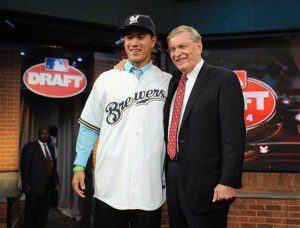
12. Milwaukee Brewers –Kodi Medeiros, LHP, Waiakea HS (HI)
This was the first head-scratcher of the draft. While Medeiros has electric stuff, there are concerns about his size (6’-1”, 180) and arm slot. He throws from an almost sidearm angle and you don’t see many starters with that delivery. Also, there were higher upside arms on the board at this point. He wowed the Brewers at workouts and can touch the mid-90s with his fastball and it has a ton of movement and life. His slider sits in the upper-70s with silly break and his change-up has nice deception. There is a ton to like about Medeiros but here are also some concerns.
13. San Diego Padres — Trea Turner, SS, North Carolina State
The Padres selected one of my personal favorites in the draft in Turner, an 80-grade runner who should put up big stolen base numbers at the next level. He also is a slick defender at short with a strong arm and unlimited range. He has a great approach at the plate and showed some developing pop in his bat this year — the one knock on him. The 6’-1”, 170 pound right-hander hit .321/.418/.516 over 54 games and really turned it on in the second half. He added 12 doubles, eight home runs, 26 stolen bases and 37 walks to just 25 strikeouts.
14. San Francisco Giants — Tyler Beede, RHP, Vanderbilt
It seemed like every pitch Beede threw was put under a microscope this year. He is still leading his team to the College World Series but the draft pressure is now off his back — if he even felt it anyway. The one knock on him was his command and he started the year off showing great control of his stuff. Then he stumbled and was dropping. Some even had him out of the first round leading up to the draft. After a brilliant 14 strikeout performance against Xavier on May 30 in which he was hitting 99 mph, he was shooting up everyone’s draft boards. The Giants were a team that was locked in on him for a while, and that performance just gave them more to get excited about. At 6’-4” and 215 pounds, he features a plus fastball, plus change-up and his curveball shows plus potential. Another pick that will be seen as a huge steal a few years from now.
15. Los Angeles Angels — Sean Newcomb, LHP, Hartford
Newcomb was another name that was rising fast heading up to the draft. With Hoffman and UNLV RHP Erick Fedde needing Tommy John surgery, the 6’-5”, 240 pound southpaw suddenly became more attractive. With a fastball that can touch 98 mph and a wipe-out slider, he dominated his opponents this season. Over 14 starts, he posted a 1.25 ERA, 0.95 WHIP and 106 K/38 BB over 93.1 innings. He held opponents to a miniscule .162 BAA and allowed just seven extra-base hits — all doubles. The only concern with him is his command but everything else is top-of-the-rotation stuff.
16. Arizona Diamondbacks — Touki Toussaint, RHP, Coral Springs HS (FL)
The Diamondbacks love their pitching and selected a kid who has some of the highest upside in the draft. At 6’-3” and 190 pounds, Toussaint has a pitcher’s body to dream on and he has a quick, electric arm. He can touch 97 mph with his fastball and his mid-70s curveball is plus when on. He is still relatively new to pitching, and his command can get him in trouble at times. He is a terrific athlete, however, and that bodes well for future command.
17. Kansas City Royals — Brandon Finnegan, LHP, TCU
Word was the Royals were hot on Medeiros, and Finnegan may have been behind him on their board. There are similarities between the two as Finnegan also raises the “too small” red flag. At 5’-11” and 185 pounds, the southpaw can touch triple-digits with his fastball and sits in the mid-90s. He adds a plus slider and a solid change-up. He had a shoulder injury earlier in the season but has looked fully healthy since his return. Through 16 starts, he has a 2.12 ERA, 0.99 WHIP and 129 K/27 BB over 91.1 innings, showing great command of his stuff. At worst, they may have just selected Billy Wagner 2.0.
18. Washington Nationals — Erick Fedde, RHP, UNLV
Fedde is another victim of the Tommy John epidemic that has been going around baseball this year. Once considered a top-10 pick, he fell right into the lap of the Nationals, who have shown not to be afraid to select kids with arm injuries in the first round as they took RHP Lucas Giolito with the 16th overall pick in 2012. The 6’-6” right-hander is currently lighting up the Sally League, and his success obviously played a part in going for Fedde. When healthy, Fedde’s stuff is electric. His fastball sits in the low 90s and has late life. He flashes a plus slider and his change-up is solid. He has great command of his stuff and, at 6’-4” and 180 pounds, he has projection left. He finished the season with a 1.76 ERA, 1.03 WHIP and 82 K/21 BB over 76.2 innings.
19. Cincinnati Reds — Nick Howard, RHP, Virgina
Howard was getting a lot of first-round buzz leading up to the draft, and most thought he would land with the Tigers at pick 23. Instead, the Reds nabbed him and are hoping the 6’-3”, 215 pound right-hander can be a starter at the next level. He was a starter as a sophomore and has been the team’s closer this season where he has 50 K/12 BB over 29.1 innings and has held opponents to a .184 BAA. His fastball touches 98 mph but sits 90-93 mph as a starter. He adds an above-average slider and his change-up is still developing. A big kid with a power arm that doesn’t have a lot of mileage on it, the hope is he can develop his off-speed stuff and refine his command.
20. Tampa Bay Rays — Casey Gillaspie, 1B, Wichita State
First basemen don’t typically get a lot of love in the first round of the MLB draft, but Gillaspie is a plus defender with huge offensive upside. At 6’-5” and 240 pounds, the switch-hitter has a great approach at the plate and tremendous power. As a sophomore, he drew a ridiculous 62 walks over 66 games and added 16 doubles and 11 home runs. This season, he hit .389/.520/.682 over 59 games with 15 doubles, 15 home runs and 58 walks to just 28 strikeouts. He is a high-character kid with a great track record of hitting.
21. Cleveland Indians — Bradley Zimmer, OF, San Francisco
I don’t think the Indians expected Zimmer to be here and had to be excited when he was. At 6’-5” and 200 pounds, the left-handed hitter is a great athlete with a plus arm like his brother — Royals top pitching prospect Kyle Zimmer. Bradley showed a much improved hit tool this season to go along with his raw power and plus speed. He has a great shot to stick in centerfield due to his arm, speed and instincts but could move over to right where the bat would play well. Over 54 games, he hit .368/.461/.573 with 10 doubles, seven triples, seven home runs and 31 walks to 34 strikeouts. He swiped 23 bases, but was thrown out 11 times, showing some needed improvement in his base running.
22. Los Angeles Dodgers — Grant Holmes, RHP, Conway HS (SC)
Holmes was getting a lot of top-10 love earlier in the season, and the Dodgers got a steal landing him here. At 6’-2” and 190 pounds, the right-hander can hit the upper-90s with his fastball and he adds a plus curveball that sits 79-81 with late bite and great depth. His change-up is already an above-average offering, sitting 84-86 mph and he commands all three. His present stuff is only behind Aiken’s on the prep level and, even though there isn’t much projection left, he doesn’t need any.
23. Detroit Tigers — Derek Hill, OF, Elk Grove HS (CA)
Another kid who thrust himself into the first round with an impressive spring, Hill is a student of the game and his dad is a former player and current scout for the Dodgers. One of the best defenders in the draft, Hill has a strong, accurate arm, reads routes well and has plus speed. His offense is still catching up to his defense, but he shows a mature approach at the plate and, at 6’-2” and 180 pounds, most believe more power will come as he matures. Over 26 games, he hit .517/.600/.782 with nine doubles, seven triples and 18 stolen bases.
24. Pittsburgh Pirates — Cole Tucker, SS, Mountain Pointe HS (AZ)
This would be the other head-scratcher in the draft. Tucker is a very good player with a lot of upside, it’s just no one had him going this high. Like Hill, Tucker’s offense lags behind his defense right now. At 6’-3” and 185 pounds, the switch-hitter does have upside with the bat and most believe he will hit for some power as he matures due to his size. He has a real shot to stick at short due to his strong arm, speed and actions. This was obviously a strategic move, and the Pirates selected two high-upside prep arms in the next two rounds in Mitch Keller and Trey Supak. The money saved on Tucker will go to the signing of those two and the Pirates ended up having a great draft.
25. Oakland Athletics — Matt Chapman, 3B, Cal State Fullerton
At 6’-2” and 205 pounds, Chapman has a plus/plus arm and can touch 98 mph on the mound, although he didn’t toe the rubber this season. He has power, it just hasn’t shown up in games yet. Over 54 games, he hit .312/.412/.498 with 16 doubles and six home runs. He drew 27 walks to just 26 strikeouts and does have a good approach at the plate. With his arm and athleticism, he should be a very good defender at third, but he will have to show more power to justify the position.
26. Boston Red Sox — Michael Chavis, 3B, Sprayberry HS (GA)
The Red Sox got another personal favorite of mine and a kid who was rising all year as he showed improvement in his overall hit tool. At 5’-11” and 185 pounds, Chavis has tremendous power and routinely puts on shows in the cage. It shows up in games, too, as he launched 14 home runs over 30 games this spring, hitting .536/.632/1.143 with 17 stolen bases. He’s a very good athlete who plays shortstop but could handle second or third due to his strong arm and soft hands.
27. St. Louis Cardinals — Luke Weaver, RHP, Florida State
Weaver was dropping on a lot of people’s boards as the season went on because his lack of a third pitch raised concerns about his future as a starter. He does feature two above-average pitches in a fastball that can touch 97 mph and sits 91-93, as well as a low-80s change-up with deception, but his slider needs work. At 6’-2” and 170 pounds, there are concerns about his size, as well. Over 16 starts, he had a 2.62 ERA, 1.04 WHIP and 85 K/23 BB over 106.1 innings. He is a Cardinal now, however, and they will make him an All-Star.
Feel free to follow me on Twitter @DanMKirby for MLB draft updates, high school and college news, as well as Chicago Cubs ramblings.


